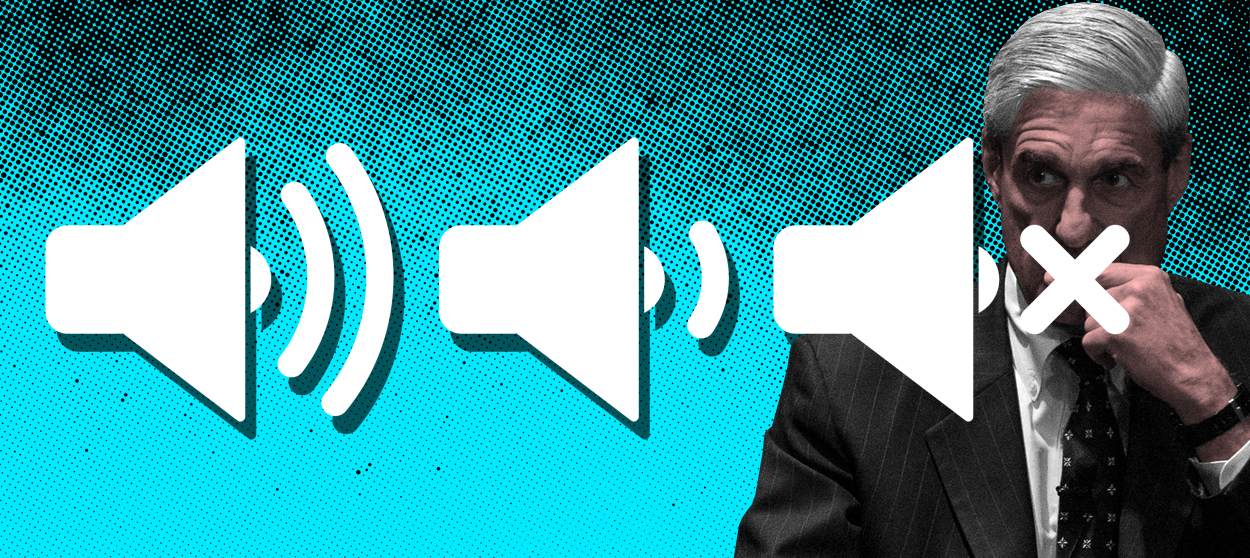Robert Mueller's silence has become a problem
It's time for him to testify. He owes it to the American people.


A free daily email with the biggest news stories of the day – and the best features from TheWeek.com
You are now subscribed
Your newsletter sign-up was successful
Turns out, Robert Mueller is camera-shy.
Since being named special counsel in the Russia investigation two years ago, Mueller has out-Garboed Garbo in his ability to maintain a public silence. Mostly, this has been a good thing — it is easier to take a prosecutor seriously when he or she avoids grandstanding on cable news and instead sticks to the work of taking down the bad guys. Mueller's ability to keep his lips zipped was especially striking in contrast with President Trump, whose constant commentary on the investigation sometimes provided his critics with fresh ammunition.
Now, however, Mueller's reticence is becoming a problem. He has been summoned to discuss his report before the House Judiciary Committee — but he wants to do it, more or less, behind closed doors, away from the television cameras that would broadcast his comments to the world.
The Week
Escape your echo chamber. Get the facts behind the news, plus analysis from multiple perspectives.

Sign up for The Week's Free Newsletters
From our morning news briefing to a weekly Good News Newsletter, get the best of The Week delivered directly to your inbox.
From our morning news briefing to a weekly Good News Newsletter, get the best of The Week delivered directly to your inbox.
"He envisions himself correctly as a man of great rectitude and apolitical and he doesn't want to participate in anything that he might regard as a political spectacle," Rep. Jerry Nadler (D-N.Y.), the committee's chairman, told Rachel Maddow last week.
That's almost admirable.
But there's far more at stake than Mueller's self-regard. If he wants the public to understand — truly understand — the conclusions he and his team came to in the Russia report, then he has to sacrifice his silence, go before the cameras, and start talking. To beat the constant storm of tweets, cable news commentary, propaganda, and lies that swirl around Trump — and to project a resounding sense of clarity — Mueller must at long last submit to the process, if only for a day.
Where spin has been plentiful during Trump's presidency, clarity has been in thin supply. The president has stood before cameras to proclaim that Mueller's report exonerates him of colluding with Russia, and of obstructing justice. Attorney General William Barr held an on-camera press conference just minutes before releasing a redacted version of the report, putting his own spin on the findings.
A free daily email with the biggest news stories of the day – and the best features from TheWeek.com
The reality, of course, is a bit more complex — and certainly less exonerating — than what Trump and Barr have presented to the public. And we know Mueller has been frustrated because he believes that presentation has confused and even misled the public.
Still, we haven't heard his voice.
If we were more of a literate society, maybe this wouldn't matter. But most Americans haven't read Mueller's report. Democrats tried staging a public reading of the report in mid-May, but that barely cut through the clutter.
"I'd be amazed if even 1 percent of the American people have read the Mueller report, in part or in its entirety," said Rep. Jamie Raskin (D-Md.). "We have to catch up the American people any way we can."
The best way to catch them up, of course, is for Mueller to testify publicly. He is best positioned to set the record straight. Rather than having Trump or Barr or any number of lickspittle Republicans in Congress offer their interpretation of Mueller's findings to the public, Mueller himself could explain precisely what he found, and precisely why he made the key decisions he did. Americans who haven't read the report for themselves could at least see and hear the person who created it, briefly, and judge accordingly.
Mueller is right about one thing: An appearance before Congress would become a political spectacle. But if you're going to investigate a presidential administration in the 21st century, "political spectacle" is part of the job description. It won't be comfortable for him. It probably won't be comfortable for the president either — he is reportedly terrified at the prospect of the special counsel testifying before a live television audience.
The president's fears shouldn't be Mueller's concern; clarity should be his top priority. If Mueller is truly worried about "public confusion" over his report, there is one choice left: He can go before Congress, on TV, and explain himself.
Joel Mathis is a writer with 30 years of newspaper and online journalism experience. His work also regularly appears in National Geographic and The Kansas City Star. His awards include best online commentary at the Online News Association and (twice) at the City and Regional Magazine Association.
